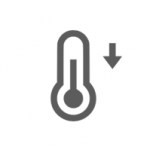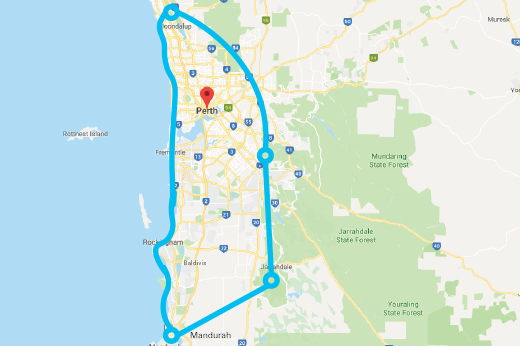Reverse Cycle
REFRIGERATED AIR CONDITIONERS (REVERSE CYCLE)
How does an air conditioner work?
Despite what many people think your home air conditioning system working in summer does not add cold air into the room. It actually draws heat away from existing air in the room and re-delivers it with an absence of heat. The end result is space with significantly less heat, which makes it feel cooler to the occupants. The major components of an air conditioning system are:
- a compressor
- a condenser
- an expansion valve
- an evaporator
- refrigerant
The refrigerant gas is compressed by the compressor unit, transforming it into hot high-pressure gas. The gas is then forced through the condenser which is ultimately a series of winding coils. This process dissipates the heat and condenses the refrigerant into a liquid. From here, the liquid is pushed through and expansion valve. This again sees the refrigerant change state as it evaporates into a low pressure gas. It begins its final run through another series of coils in the Evaporator. It is at this point that your air conditioner is cooling the air by absorbing heat. Through out this process, a series of fans circulate air over both sets of coils, returning heat to the outside air and blowing cold air into the room.
Refrigerated air-conditioning has been around since the latter part of the 18th century. Since that time it has become generally excepted that an air conditioned environment has a number of advantages The advantages of environmental control are now widely accepted However, the need to conserve energy has become more important due to increasing energy costs and the detrimental effects of the energy use on the environment. Air-conditioning can be generally defined as a process whereby air in an enclosed area is controlled in terms of temperature,
humidity, ventilation and cleanliness.
This process includes systems for reverse cycle cooling and heating. Only refrigerated air-conditioning can maintain low temperatures and humidity under adverse weather conditions. The recommended air conditioning outer parameters for comfort in summer are 24degrees dry bulb and 40-60% relative humidity, with air velocities around 0.05-0.2m/sec. Research indicates that 80% of people will feel comfortable under the conditions.
Air conditioners can be confusing, so where do you start??
Where do start?
When looking to purchase a new air conditioner for your home, it’s difficult to know where to start, so we have put together some pertinent questions that will help you get things moving forward.
- Do you want to cool one living space, a few rooms or the whole house?
- If you cool one room would it have a flow on effect to other living spaces?
- What type of system will best suit my needs. A split system or ducted air conditioning system?
- What AC manufacturers is the best value for money (not necessarily the cheapest)?
- Who can legally install Air Conditioner in my area?
- Am I prepared to undertake this whole process myself or should I engage the services of professional?
- How can make the most effective use of my time and money?
Once you have answered these questions then you have starting point. We are the recognised experts here in Perth, so we have no doubts about our ability to help you, but it’s you who has to answer the questions. It’s you that will need to be comfortable to move forward. We are licensed installation experts and are only too happy to help. Just pick up the phone and call 1300 278 821 or email us on enquries@waclimatesolutions.com.au
Important points to consider Before purchasing & installing a new air conditioner
There is number of important factors you should take into consideration.
Here is a list of 12 split system features you should carefully consider before handing over any $ We suggest you print this list off and have it with you throughout your research.
1 Warranty
This can be perhaps the most important consideration, It is important to research the warranty information to ensure that if there is any fault or problem during this period than the unit will be replaced or serviced free of charge. As a bare minimum we would recommend a 1year warranty period that cover both parts and associated labour costs. The more reputable brands normally have domestic warranty of 5 years
2 Size it up
Size is one of your most important considerations You need to decide whether you are cooling a single room, a selection of rooms or the entire house. A unit that is too big for the space you want to cool will create an excess of refrigerated air and a damp, humid feeling. On the other side of the coin, an air conditioning system too small for the living space will be running constantly wasting energy and adding countless $ to your power bill.
3 Temperature range
Consider the area & the climate in which you live. Will the AC’s temperature range suit this climate? Will it ensure you have comfortable temperatures in the middle of summer and winter. Be very thorough in investigating an air conditioner that will be adequate for your particular needs.
4 Temperature increments
Ensure that the temperature can be changed in increments of 1 degree or 2 degrees at the very most. This is important in 2 respects. Firstly allows you greater level of command and precision over controlling your living space comfort Secondly and perhaps more importantly, it has an enormous bearing on energy consumption and your power bills.
5 Fan speed settings
The more choices you have in fan setting the better. Again, it ensures you have a greater level of control over your living environment and ultimate comfort levels. There is also the added benefit of the energy efficiency-the more fan speed settings you have available, the more energy savings you will realise.
6 Energy Saver Switch
Some of the more reputable brands may have a “Sleep Setting” switch. This in essence, is an “Energy Saver” because whilst in this mode slows the cooling process to a minimum. So when you are sleeping the unit is saving energy and thus improving your power bill.
7 Easy access Return Air Filter
One of the advantages of ducted split system air conditioner is that they also purify the air through a filtration system. Every machine will have a filter that should be cleaned at a regular interval(usually 3 monthly). Its always good practice to ensure that your air conditioning unit has a slide out or cassette style filter rather than a frame enclosed type. This will save a lot of future maintenance headaches as you can do it yourself. The slide type filters are easy to remove, clean and then re install.
8 Inverter
An inverter is basically a variable speed device on the compressor drive motor. It allows the motor to ramp up and down depending on the output requirements at the time. An inverter system tends to be very efficient of part load operation, which is a more common mode in a household environment. As such, if you are planning on using your air conditioner for long periods in a hot climate, it may be worth considering paying a little extra and getting an Inverter system.
These systems may have a lower star rating than a standard AC due to the capacity rating being calculated at full load.
Don’t be fooled, an inverter AC will spend most of its working life at part load where it will be more efficient than your conventional unit.
9 Star Rating
Look for the stars! The more stars, the more energy efficient the unit and the less they cost to operate. Unfortunately, they’re also more
expensive, so you have to find a balance. In Australia, particularly here in Perth, there are 2 types of Energy Rating Labels.
(1)Cooling Only Models-you will find a blue band of stars and a blue box containing an energy consumption figure.
(2)Reverse Cycle Models-you will find a blue band of stars & a blue box containing an energy consumption figure. In addition you will find a red band of stars & a red box containing an energy consumption figure. So there are 2 energy consumption ratings
-Blue=Cooling
-Red+ Heating
10 Air flow rating
Look into the specifications of the air conditioner and establish the litres per second of air the machine can throw out on high and low-that being how many litres per second(lps) will the indoor unit of the air conditioner throw out into the living spaces. Will this be enough to satisfy the max rooms you would like on when the weather is at its hottest or coldest conditions outside.
11 Value for your money
Take into consideration the initial outlay for the system v the ongoing power bills you can expect from the star rating(energy efficiency). You will normally pay more for a higher star rating but this will often be offset (and more) by reduced power bills over the longer term.
12 Noise Levels
How quiet is the system that you’re looking at? The last thing you want is a loud, audibly intrusive unit that affects you’re living comfort. Beware of unnecessary noise from an air conditioner-it will make your life hell. Check the decibel specifications of the unit-the reputable brands seem to have the lowest decibel levels.
Providing better solutions by
our areas of focus and excellence





SERVICING FROM JOONDALUP TO MANDURAH
FREE CALL – 1300 278 821
Email: enquiries@waclimatesolutions.com.au
SEND US A NOTE
Copyright © 2019 – WA Climate Solutions

